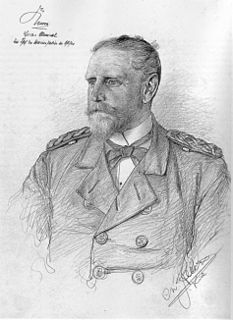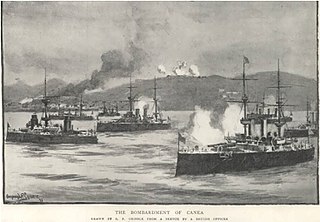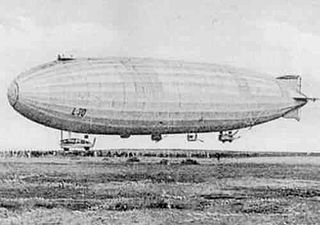 W
WThe Imperial German Navy was the navy created at the time of the formation of the German Empire. It existed between 1871 and 1919, growing out of the small Prussian Navy, which primarily had the mission of coastal defence. Kaiser Wilhelm II greatly expanded the navy, and enlarged its mission. The key leader was Admiral Alfred von Tirpitz, who greatly expanded the size and quality of the navy, while adopting the sea power theories of American strategist Alfred Thayer Mahan. The result was a naval arms race with Britain as the German navy grew to become one of the greatest maritime forces in the world, second only to the Royal Navy. The German surface navy proved ineffective during World War I; its only major engagement, the Battle of Jutland, was a draw, but it kept the surface fleet largely in port for the rest of the war.. However, the submarine fleet was greatly expanded and posed a major threat to the British supply system. The Imperial Navy's main ships were turned over to the Allies, but were scuttled at Scapa Flow in 1919 by German crews.
 W
WThe Imperial German Navy was the navy created at the time of the formation of the German Empire. It existed between 1871 and 1919, growing out of the small Prussian Navy, which primarily had the mission of coastal defence. Kaiser Wilhelm II greatly expanded the navy, and enlarged its mission. The key leader was Admiral Alfred von Tirpitz, who greatly expanded the size and quality of the navy, while adopting the sea power theories of American strategist Alfred Thayer Mahan. The result was a naval arms race with Britain as the German navy grew to become one of the greatest maritime forces in the world, second only to the Royal Navy. The German surface navy proved ineffective during World War I; its only major engagement, the Battle of Jutland, was a draw, but it kept the surface fleet largely in port for the rest of the war.. However, the submarine fleet was greatly expanded and posed a major threat to the British supply system. The Imperial Navy's main ships were turned over to the Allies, but were scuttled at Scapa Flow in 1919 by German crews.
 W
WThe German Imperial Admiralty was an imperial naval authority in the German Empire. By order of Kaiser Wilhelm I the Northern German Federal Navy Department of the North German Confederation (1866–71), which had been formed from the Prussian Navy Department (Marineministerium), became on 1 January 1872 the German Imperial Admiralty. The head of the Admiralty administered the Imperial Navy under the authority of the imperial chancellor and the supreme command of the Emperor. It lasted until 1889, undergoing several reorganizations, but proved an impractical arrangement given the constant growth and the expansion of the Imperial Navy. Finally it was abolished in April 1889 and its duties divided among three new entities: German Imperial Naval High Command, the Imperial Naval Office (Reichsmarineamt), and the Imperial Naval Cabinet. The Imperial Naval High Command was, on 14 March 1899, replaced by the German Imperial Admiralty Staff, which simply transferred over most of the personnel of the Admiral Staff detachment of the former Naval High Command.
 W
WThe German Imperial Admiralty Staff was one of four command agencies for the administration of the Imperial German Navy from 1899 to 1918. While the German Emperor Wilhelm II as commander-in-chief exercised supreme operational command and control of the naval forces, the military staff was split into the Admiralty, the Naval Office, the Naval Cabinet, and the Inspector-General. The command structure had a negative impact on German naval warfare in World War I, as a professional head of the Imperial Navy, similar to the First Sea Lord, was not established until August 1918. After the war and the German Revolution of 1918–19, the Admiralty Staff became subordinate to the Naval Office and was finally disestablished by order of the German President.
 W
WThe German Imperial Naval Academy (Marineakademie) at Kiel, Germany, was from 1872 until 1910 the higher education institution of the Imperial German Navy, Kaiserliche Marine, where naval officers were prepared for service in the higher levels of command.
 W
WThe German Imperial Naval High Command was an office of the German Empire which existed from 1 April 1889 until 14 March 1899 to command the German Imperial Navy. A similarly named office existed in the Prussian Navy and the Kriegsmarine of Nazi Germany.
 W
WThe Imperial Naval Office was a government agency of the German Empire. It was established in April 1889, when the German Imperial Admiralty was abolished and its duties divided among three new entities: the Imperial Naval High Command, the Imperial Naval Cabinet and the Imperial Naval Office performing the functions of a ministry for the Imperial German Navy.
 W
WImperial German plans for the invasion of the United Kingdom were first conceived in 1897 by Admiral Eduard von Knorr, commander of the Imperial German Navy, against a background of increasing Anglo-German rivalry and German naval expansion. Acknowledging the inferiority of the small German fleet, his concept called for a preemptive strike against the Royal Navy to establish temporary naval supremacy. This would be followed by an immediate landing, before British naval reinforcements re-established command of the sea. Subsequent studies determined that the shortest possible sea-crossing would be a prerequisite for success, requiring the use of port facilities seized in Belgium and the Netherlands to embark the expeditionary force. Reconnaissance of the English east coast was completed and potential landing sites in East Anglia were selected.
 W
WThe International Squadron was a naval squadron formed in early 1897 by a number of Great Powers just before the outbreak of the Greco-Turkish War of 1897 to intervene in a native Greek rebellion on Crete against rule by the Ottoman Empire. Warships from Austria-Hungary, France, the German Empire, Italy, the Russian Empire, and the United Kingdom made up the squadron, which operated in Cretan waters from February 1897 to December 1898.
 W
WThe Marine-Regatta-Verein (MRV), "Naval Regatta Union", is a yacht club of the German Navy. Its main branch is located in the harbor city of Kiel, and it has branches in different states of Germany. This club promotes both sailing and powerboating. Many of its members also are engaged in yacht racing and yacht cruising around the world.
 W
WThe Venezuelan crisis of 1902–1903 was a naval blockade imposed against Venezuela by Great Britain, Germany and Italy from December 1902 to February 1903, after President Cipriano Castro refused to pay foreign debts and damages suffered by European citizens in recent Venezuelan civil wars. Castro assumed that the American Monroe Doctrine would see Washington intervene to prevent European military intervention. However, at the time, US president Theodore Roosevelt and his Department of State saw the doctrine as applying only to European seizure of territory, rather than intervention per se. With prior promises that no such seizure would occur, the US was officially neutral and allowed the action to go ahead without objection. The blockade saw Venezuela's small navy quickly disabled, but Castro refused to give in, and instead agreed in principle to submit some of the claims to international arbitration, which he had previously rejected. Germany initially objected to this, arguing that some claims should be accepted by Venezuela without arbitration.
 W
WZeppelin "L 30" was the first R-class "Super Zeppelin" of the German Empire. It was the most successful airship of the First World War with 31 reconnaissance flights and 10 bombing runs carrying a total of 23,305 kg of bombs, with the first ones targeting England, and the four final raids targeting Livonia and Ösel (Saaremaa). At the time of its construction, It was the world's largest Zeppelin, and with its 6 engines, "L 30" could reach speeds higher than 100 km/h, making it the fastest Zeppelin in the world too.